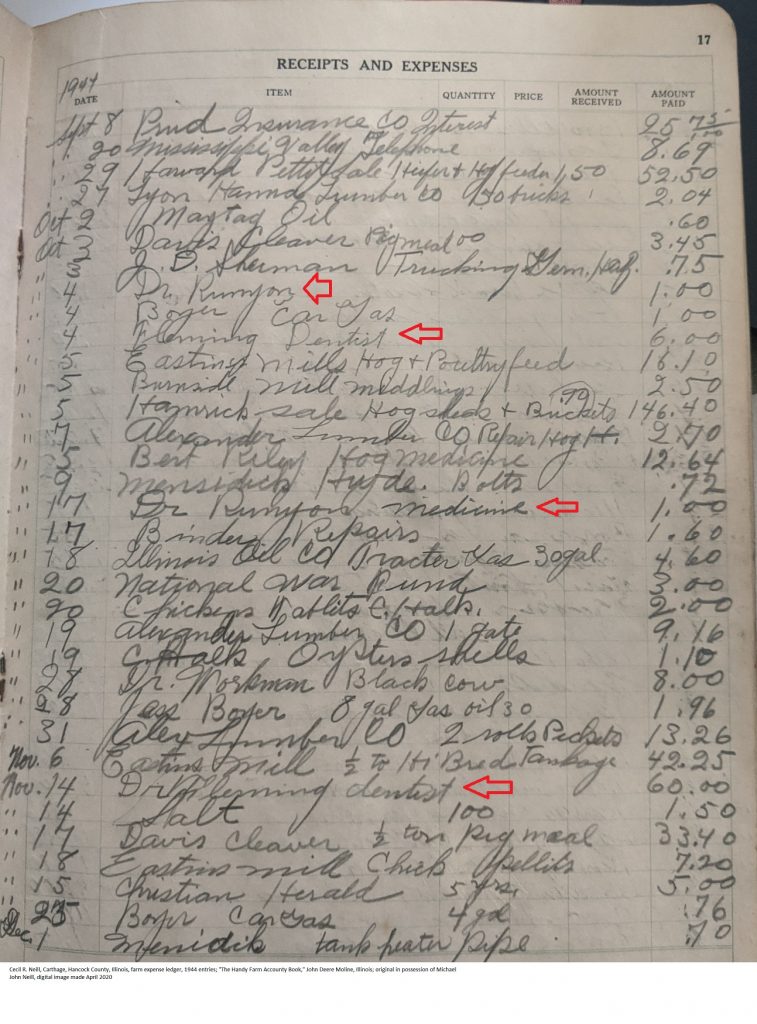It is not the most startling of genealogical revelations, but it is instructive.
I was reading through the entries in my Grandpa Neill’s farm ledger absentmindedly in hopes of finding something that met my loose definition of interesting. There were two entries for the dentist in the fall of the year. The second entry for $60 caught my eye.
Then I wondered, “are those Grandma’s dentures?”
What happened next is instructive. I shut the book without looking in it any further and forced myself to think what I knew about Grandma’s dentures. There was one thing I was absolutely certain of because I had first hand knowledge: she only had a lower plate because I had seen it several times and, as far as I knew, she had had them as long as I could remember. I tried to remember if I knew when Grandma got her false teeth and all that came to mind was she got them when she was in her thirties. I can remember telling my kids to take care of their teeth because my Grandma had hers pulled when she was in her thirties when her children were small. I know I had given that warning to my children twenty years ago.
Then I looked at the date in the ledger. It was 1944. On October 4th, Grandpa paid the dentist $6 and on November 14th he paid him $60. That $60 charge was a significant amount compared to the other entries in the ledger. It would have nearly bought a ton of pig meal and have paid for 60 one year subscriptions to the Christian Herald.
The only other thing I remember Grandma saying was that they could only afford a lower-set of teeth.

The difficulty with some pieces of information is that we don’t think to write them down and document them before we find something that references them. It can be difficult at times to remember what we were actually told from what we “got in our head” for some incorrect reason. It can be even more difficult once we have read something or come across some information about an event to separate out what we knew before from what we read somewhere.
A little food for genealogy thought. Just make certain you use all your teeth to chew on it.







4 Responses
One thing to keep in mind is something my mother has mentioned to me, people didn’t not always have there teeth pulled because they were bad. She told me that people who had teeth that were very crooked or not pleasing to the “eye” such as buck teeth had them pulled and replaced with false ones. Before braces became common place there wasn’t much you could do, take a look at old movies and you can tell the difference between low level actors and stars by there teeth.
That’s a good point and definitely possible. Grandma seemed to intimate in other offhand comments that it wasn’t for cosmetic reasons, but it’s possible.
The more I think about it and try to remember what she actually said, versus what I inferred from what she said, she just said “they were bad.” My inference was that there was something medically wrong with them for one reason or another. It’s entirely possible that it was because of their appearance or how they “grew in.” That gives me an idea for another tip reminding all of us (myself included) to think about what someone actually said versus what we inferred from what they said.
This isn’t about teeth…though my gram had hers all pulled too, but I was remembering a tip of yours from past posts reminding us to leave a record of our own lives for future family genealogists. And in this time of covid 19 with such major life style changes in place there will be curiosity as to how this effected “ancestors” and the community they lived in. We wondered for the longest time if a grand had died from the 1918 flu until we could find a detailed death certificate… he didn’t. This is certainly a moment for you to remind us again of sharing our own history.